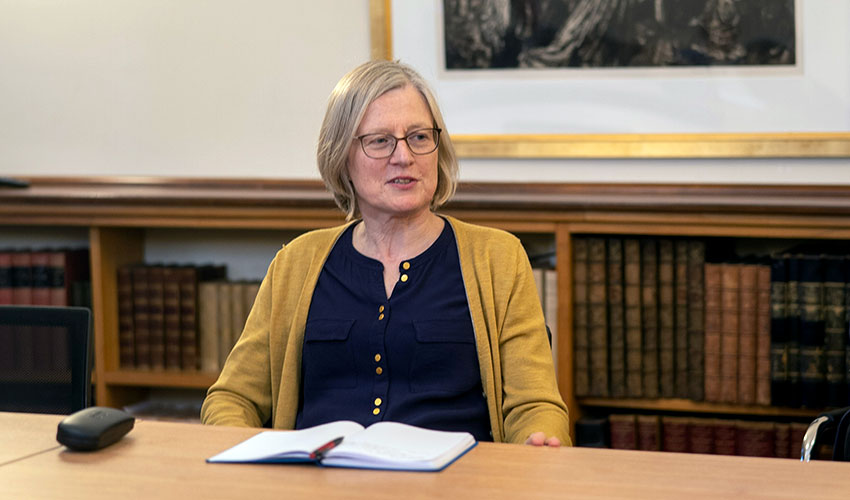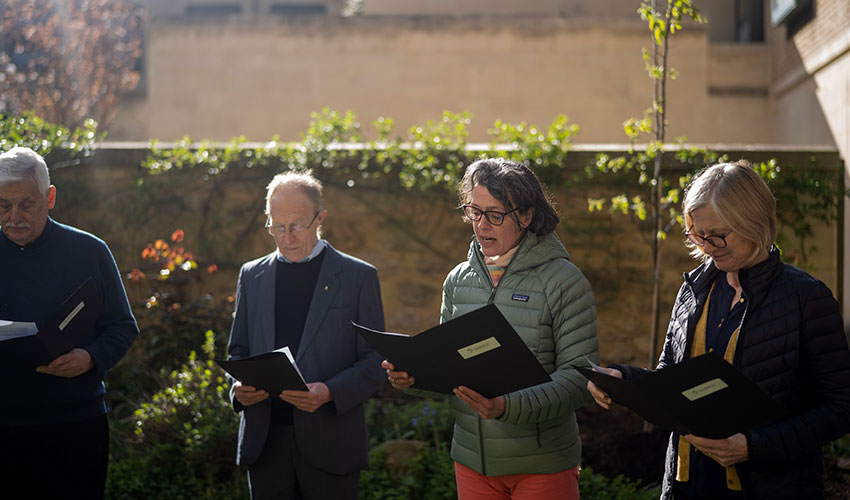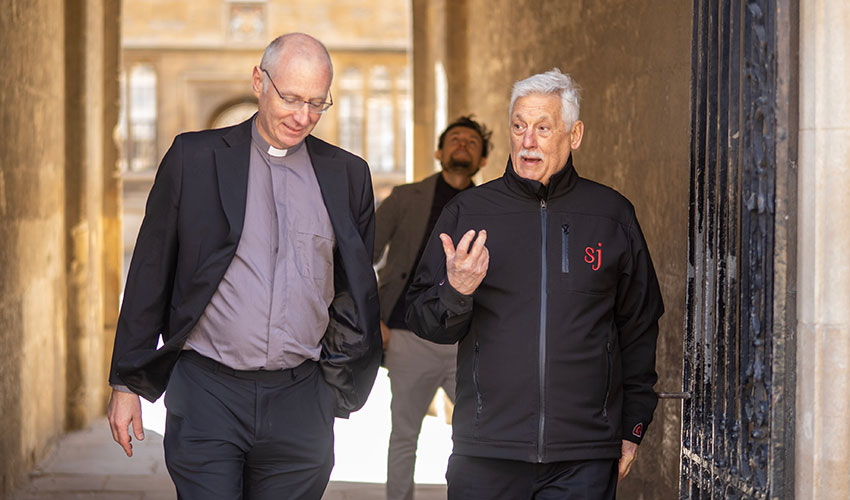In Oxford, Father General visits the Laudato Si’ Research Institute
On the third day of his visit to the British Province, Fr. Arturo Sosa, Superior General, went to Oxford. He visited Campion Hall, the Society’s College, which has been part of this prestigious university for over 125 years. It was not only an opportunity to get in touch with a long tradition, but also to get to know a very current and new project of the Oxford Jesuits: the Laudato Si’ Research Institute.
Professor Celia Deane-Drummond, director of the Institute, explains how this Jesuit work puts Pope Francis’ vision of integral ecology at the heart of its mission. She says:
“As
a collective of researchers from different intellectual backgrounds, we seek to
use a transdisciplinary method which goes beyond single disciplinary silos. We
understand integral ecology as having a core foundation in theology but arising
out of the real needs and practical contexts that express the twin cry of the
earth and the cry of the poor. Importantly, we are establishing a variety of
research projects in collaboration and dialogue with different academic
partners within the University of Oxford and beyond, and with civil society
organisations globally.

Professor Celia Deane-Drummond, director of the Institute.
Our research informs our teaching strategy, and we are involved in contributing to new and established postgraduate teaching programmes, particularly with the Oxford Department of International Development, the School of Geography and the Environment, and the Faculty of Theology and Religion. We also collaborate with cross-disciplinary organisations within the University of Oxford, which, while not including theological analysis, do deal with some key integral ecology concerns such as poverty reduction, biodiversity conservation, cultural diversity, democracy and inequality. We are developing networks of researchers and civil society actors, particularly among Jesuit Universities and communities where Jesuits are present worldwide through their intellectual and social apostolate. We will be establishing a Global Integral Ecology Research Network (GIERN), directed by a Jesuit, which will escalate our global impact through strengthening partnership projects around the world.
While
care for our common home shapes the charism of LSRI in a primary sense, all the
other Apostolic Preferences find
expression in the way we work and conduct our research and outreach efforts.
Ignatian spirituality informs the way we carry out our work and discern
collectively which projects to develop and foster, given the plethora of
possible opportunities. Through our work in policy and practice we aim to
listen carefully to communities who are marginalised and have their rights and
dignity violated, particularly in the Global South, and we work towards
understanding underlying causes, collaborating to enact socio-ecological
change.”

Later on, Father Sosa presided over the Eucharist with the Oxford Jesuits, which was attended by members of the wider Campion Hall community. In his homily, he explicitly referred to theLaudato Si’ Research Institute, emphasizing that it is a response to the Society’s fourth Universal Apostolic Preference and also rooted in calls from the 36th General Congregation to engage theologians, philosophers, and other intellectuals in addressing the current global crisis. He then spoke about the significance of the Jesuit presence in a university like Oxford:
“I
am used to visiting Jesuit universities around the world and reflecting with
them on the challenges they face today: their identity, their pedagogy, the way
in which they form young people with a passion for the Gospel, the way they
engage secular society in all its complexity, including the new politics of
populism. A Jesuit university bears the name of Jesus in a particularly
straightforward way, and it has the task of forging a comprehensive culture
shaped by faith in the name of Jesus. In theory, we should expect a Jesuit
university to preach and live that faith in its intellectual pursuits, in its
pastoral provision, in its administrative function and in the relationships and
solidarities it enters into. Last year I had the pleasure of addressing the International
Association of Jesuit Universities and I stressed to them the importance of
solidarity in the life of the Jesuit university, the solidarity we feel as
members of one human family “enriched by intercultural and intergenerational
relationships, always ready to lend a hand to whoever needs it.”

It strikes me that Campion Hall is an unusual, perhaps unique institution in the Society: an authentic Jesuit presence within an ancient and elite University, which, while secular today, has profoundly Christian roots. As a small, self-contained institution, you do not need to worry so much about losing your charism or its dilution into slogans and clichés. Your Jesuit character is more or less assured. No, your challenge must surely be to speak out of the clarity of that faith into this great, world-class centre of learning, a University which has so much to teach us and yet which is no longer entirely at home in the Christian skin it has inherited from its medieval foundation. (...)
The
role of Campion Hall is surely to show the wider University that the Gospel is
no spectre of retribution. It is flesh and bones. And it’s friendly. It’s real.
You can touch it and feel it. It’s not some disembodied ethos. It’s people
living together in solidarity because God lives in total, unconditional
solidarity with them.”







